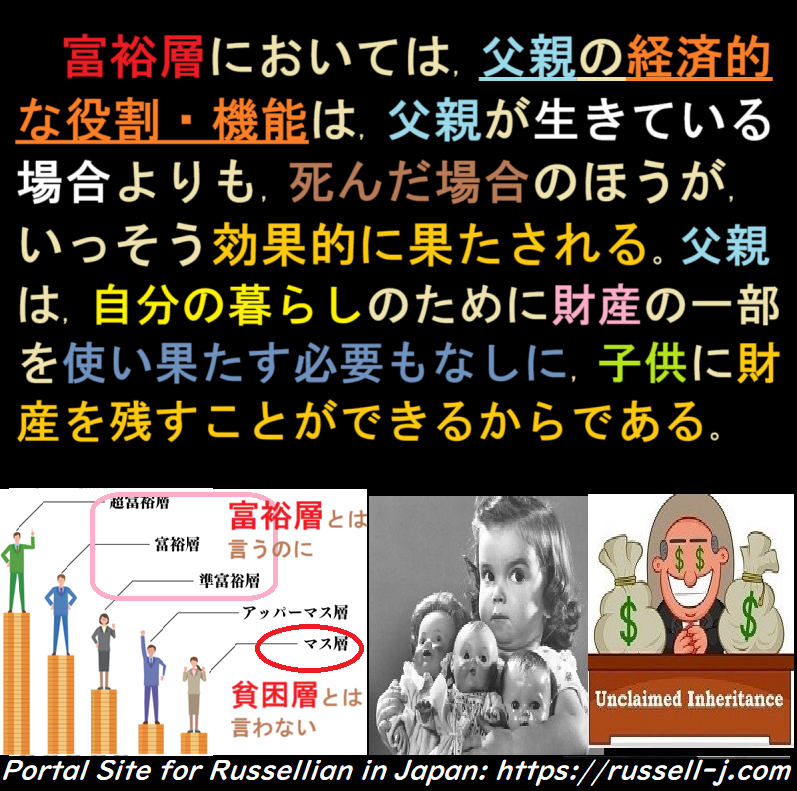
 ラッセル関係電子書籍一覧 |
富裕層においては,父親の経済的な役割・機能は,父親が生きている場合よりも,死んだ場合のほうが,いっそう効果的に果たされる。父親は,自分の暮らしのために財産の一部を使い果たす必要もなしに,子供に財産を残すことができるからである。
The economic function of the father can be performed, in the well-to-do classes, more efficiently if he is dead than if he is living, since he can leave his money to his children, without having to use up part of it on his own maintenance.
Source: Bertrand Russell: Marriage and Morals, 1929
More info.:https://russell-j.com/beginner/MM09-090.HTM
<寸言>
運命論に立たない限り、自分が貧しい家庭に生まれるか、裕福な家庭に生まれるかは、生まれる前から決まっていたとは言えません。しかし、いったんこの世に生を受けると、自分の生まれた環境や境遇を、あたかも運命であるかのように感じることが少なくないのではないでしょうか?
幸運にも裕福な家庭に生まれた子供は、快適な生活を当然のことと受け止め、それにふさわしい感性や考え方を自然に身につけていきます。もちろん、親がしっかりしつけていれば、貧しい子供たちを見下すような態度はとらないでしょう。しかし、親自身にそうした偏見があれば、子供もまた容易に同じような偏見を身につけていきます。そうして、横柄な態度をとる若者を見ると、私たちは「親の顔を見てみたい」と言いたくなります。
本日のラッセルの言葉の中の一節「富裕層においては,父親の経済的な役割・機能は,父親が生きている場合よりも,死んだ場合のほうが,いっそう効果的に果たされる。」を読んで、どのような思いがよぎるでしょうか?
貧しい家庭に生まれた子供は、質素な生活習慣を身につけざるを得ず、もし両親が早死にすれば、生活はますます厳しくなります。一方、裕福な家(ここでは富裕層の家庭を指します)に生まれた子供は、親が死んでも経済的には困窮することはなく、むしろ親の財産をより自由に使えるようになります。もちろん、「貧しさ」も「裕福さ」も相対的なものです。しかし、「日々の暮らしに困窮する人々を顧みない人たちが多数を占める社会は劣った社会だ」と考えるべきではないでしょうか?
Unless one adopts a fatalistic view, it cannot be said that whether one is born into a poor family or a wealthy one was determined before birth. However, once we are born into this world, don't we often feel as if the environment and circumstances into which we were born were somehow destined?
A child fortunate enough to be born into a wealthy family comes to take a comfortable life for granted and naturally acquires the sensitivities and ways of thinking appropriate to such a life. Of course, if the parents provide proper upbringing, the child will not develop an attitude of looking down on poorer children. Yet if the parents themselves harbor such prejudices, the child will easily absorb the same attitudes. Thus, when we see a young person behaving arrogantly, we are tempted to say, "I'd like to see what their parents are like."
Reading today's words of Russell - "The economic function of the father can be performed, in the well-to-do classes, more efficiently if he is dead than if he is living" - what thoughts come to mind?
A child born into a poor family is inevitably forced to develop habits of frugal living, and if the parents die young, life becomes even harsher. On the other hand, a child born into a wealthy household -- here specifically referring to an affluent class -- does not suffer economic hardship even after the parents' death; rather, the child gains greater freedom in using the parents' assets.
Of course, "poverty" and "wealth" are both relative concepts. Nonetheless, should we not regard a society in which the majority are indifferent to the plight of those struggling with daily life as a degraded society?